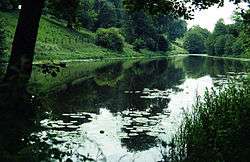Vauncey Harpur-Crewe
| Sir Vauncey Harpur Crewe | |
|---|---|
|
Calke Abbey grounds today are a haven for wildlife | |
| Born | 14 October 1846 |
| Died | 13 December 1924 |
| Spouse(s) | Isabel Adderley (1852-1932) |
| Children |
Hilda Ethelfreda Harpur Crewe (1877-1949) Winifred Isabel Harpur Crewe (1879- ) Richard Fynderne Harpur Crewe (1880-1921) Airmyne Catherine Harpur Crewe (1882-1958) Frances Caroline Harpur Crewe (1887-1960) |
| Parent(s) |
Sir John Harpur-Crewe, 9th Baronet Georgina Stanhope Lovell |
Sir Vauncey Harpur Crewe, 10th Baronet (14 October 1846–13 December 1924) was a British baronet. (See Harpur Baronets)
Sir Vauncey served as High Sheriff of Derbyshire in 1900 but apart from this position he played no part in public life. He was seen as something of an altruistic monocrat, mixing great thoughtfulness and generosity towards his tenants and employees at his two seats - Calke Abbey in Derbyshire and Warslow-Longnor in Staffordshire - with a disarming degree of aloofness and arbitrary behaviour towards his own family.
His communications with his children could be extremely strained, so much so that it was not uncommon for him to communicate with them by letter delivered by a footman. He was seen as particularly tyrannical toward his daughters. "The Misses Crewe", he was noted to say, "do not marry", and when in due course, they did, he was very displeased. One of his daughters, Airmyne, was banished from Calke Abbey for smoking a cigarette - a ban imposed on all of his household for fear of fire. She never returned to Calke during his lifetime.
After abdicating his social responsibilities Sir Vauncey concentrated on building up his enormous collection of stuffed birds, bird's eggs and Lepidoptera. His collection included birds shot by himself and also rare or abnormally coloured specimens bought from dealers and taxidermists. By the time of Sir Vauncey's death, the taxidermy collection numbered several thousand cases. Although some of this was subsequently sold to meet heavy death duties, much remained at Calke, only coming to light sixty years later.
He looked upon Calke Abbey as something of a bird sanctuary (or perhaps, in light of his passion for shooting and taxidermy, a kind of game reserve). This led to substantial neglect of the property, as he shunned any attempt at maintenance, preferring to escape into the woods whenever his wife chose to entertain guests, and to issue his farming tenants with orders not to trim hedges; these provided important nesting shelter for birds.
Sir Vauncey shunned many modern trappings - motor cars and even bicycles were banned on the estate (he preferred to rely on the horse and carriage), electricity was not installed even in his daughters' lifetime, and only after his death was the ancient plumbing system replaced. A possible explanation for this intense dislike of the modern world is that Sir Vauncey had been privately educated at Calke in his youth, and did not attend any public school or university. Accordingly, he did not possess anything in the way of an open mind, with isolation on the estate merely compounding his antiquated views and opinions. However, there may also be a hereditary element in his isolationism as several of his forebears, especially Henry the 7th Baronet, who has been called "the isolated baronet" were also noted for their unsociable natures. Sir Vauncey was descended from the isolated Baronet in both paternal and maternal lines, his parents being first cousins.
Sir Vauncey and Lady Isabel had four daughters and one son, Richard Fynderne Harpur Crewe. Unfortunately Richard was always of delicate health and he died of cancer aged 40 in 1921, before his father. There were no further surviving heirs of the 1st baronet in the male line and, on the death of Sir Vauncey Harpur Crewe in 1924, the baronetcy became extinct. The estate passed to the descendants of Sir Vauncey's youngest daughter Frances, and in 1985 to the National Trust.
 Sir Vauncey in old age
Sir Vauncey in old age
